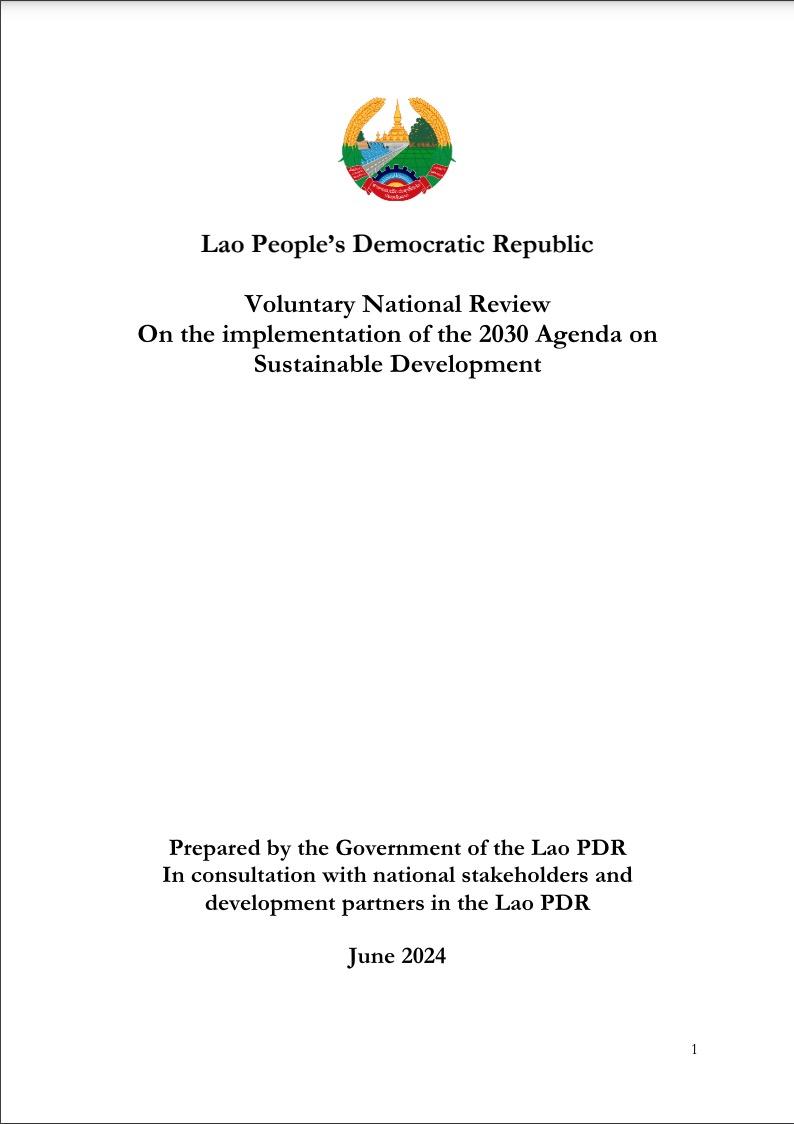Lao PDR Voluntary National Review 2024
Development, the Lao PDR’s 3 rd VNR arrives at a critical juncture, coinciding with the country’s mid-term review of the 9 th Five-Year National Socio-Economic Development Plan-NSEDP (2021-2025) and the Committee for Development Policy (CDP)’s 2024 Triennial Review of the Lao PDR’s graduation from the Least Developed Countries status. This 3 rd VNR in 2024 focuses on both Trend and TrackAnalysis, examining progress and status of all 17 SDGs and One National SDG18 “Lives Safe from UXO” while analysing more in-depth 11 key selected SDGs, which are revolved around Six Transitions: Investment Pathways to Deliver the SDGs guided by UNSDG. Its main context reflects the national planning cycle, the assessment of the national strategies, policies, plans and budgets in alignment with the implementation of the 2030 Agenda, and key focuses for the country to accelerate the implementation as part of the decade of action and its re-commitment at the SDG Summit in September 2023. This analysis not only guides the country's priorities, but also allows the Lao PDR to share best practices, practical policies and local interventions at the global level. The 2030 Agenda and the Smooth Transition for LDC Graduation - graduating from LDC category in a smooth, quality, and sustainable manner has been a long-term objective of the Lao government. The 2024 triennial review by CDP found the Lao PDR eligible for LDC graduation for the third time, putting the country on-track for graduation by 2026. However, the prolonged impact from the COVID-19, exacerbated by the on-going economic and financial difficulties and other crisis, have posed significant challenges to the Lao PDR's development aspirations and the realization of the 2030 Agenda. The Government sees the interlinkages between LDC graduation and SDGs implementation and recognizes the need for its enhanced efforts and for the international community to enhance international support measures that meet the country's development needs, aimed at prioritizing essential investments and capacity building. The primary responsibility for realizing development goals and strategies in the Lao PDR lies with its government at all levels. Multi-stakeholder engagement and participation of whole-of-government and whole-of-society are crucial to make informed policies, translate commitment into actions and mobilize sufficient resources so as to drive progress and improvement in various sectors such as education, healthcare, infrastructure, and economy. Development partners should honour their commitment and further enhance support in terms of financial resources, technical expertise, knowledge sharing and capacity building. For the Lao PDR’s LDC graduation, international partners should provide necessary support during the transition period and beyond across various fronts. Given the Lao PDR’s vulnerability to external shocks, such as climate change and economic downturns, international collaboration becomes even more critical. Development partners can help build resilience, mitigate the impact of shocks, and adapt to changing circumstances. This should involve supporting climate change adaptation and mitigation efforts, providing financial assistance during economic crises and supporting disaster risk reduction. Placing communities at the center of sustainable development entails their actions and participation in policy-making processes that affect their lives. As outlined in the 2030 Agenda, with its ambitious goals and targets, we can only achieve its transformative potential if it is fully realized at the local level. Thus, local actions play a vital role in advancing the six key transition pathways crucial for delivering the SDGs. Localization of the SDGs- Recognizes that sustainable development is not a one-sizefits-all solution and that localized strategies are essential for addressing the diverse and complex challenges. SDG localization goes beyond the realm of official authorities and requires the active engagement and participation of all segments of society at various levels. The localization of the SDGs is essential for ensuring that no one is left behind in the pursuit of sustainable development. By prioritizing local development, we can work towards creating more inclusive and equitable societies where everyone can benefit from progress and prosperity.

